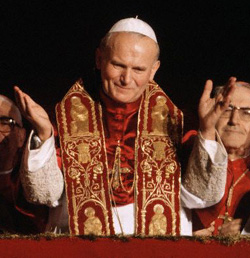 In 1978, Karol Cardinal Wojtyla became Pope John Paul II. Having earlier written Love and Responsibility which later revolutionized Church teachings on sex and marriage and having been present at the Second Vatican Council, many changes were expected from the first-ever Slavic pope. Many thought that he would challenge doctrine on abortion, birth control, male-only priesthood, premarital sex, and numerous other fundamental beliefs that society had turned against years earlier. He shocked and enraged many Catholics (particularly in America) when he refused to submit.
In 1978, Karol Cardinal Wojtyla became Pope John Paul II. Having earlier written Love and Responsibility which later revolutionized Church teachings on sex and marriage and having been present at the Second Vatican Council, many changes were expected from the first-ever Slavic pope. Many thought that he would challenge doctrine on abortion, birth control, male-only priesthood, premarital sex, and numerous other fundamental beliefs that society had turned against years earlier. He shocked and enraged many Catholics (particularly in America) when he refused to submit.
As the Conclave prepares to elect our next pope, the Church once again finds itself at a crucial point in history. Many “Catholics”, such as Catholics for Choice, the Women’s Ordination Conference, and others continue to hope (in vain) that the Church will about-face on the aforementioned matters. Let’s get one thing straight: these teachings will not change and it’s not because the Church is stuck in the Middle Ages. They are dogmatic; they CAN’T be changed, regardless of what orthodox theologians like the New York Times, Nancy Pelosi, Piers Morgan, or others like them might wish to believe.
Defining Dogma
Wikipedia defines it as “the official system of belief or doctrine held by a religion” and further that “it cannot be changed or discarded without affecting the very system’s paradigm or the ideology itself”. The Catechism states “The Church’s Magisterium exercises the authority it holds from Christ to the fullest extent when it defines dogmas, that is, when it proposes, in a form obliging the Christian people to an irrevocable adherence of faith, truths contained in divine Revelation or also when it proposes, in a definitive way, truths having a necessary connection with these” (CCC 88). Paragraphs 89 and 90 go further in-depth. Trying to change dogma is essentially moving parts of a finished 500-piece puzzle around and expecting the same final product.
Upon Pope Benedict’s retirement, a friend of mine posted on his Facebook that “the Church doesn’t need to get with the times. The times need to get with the Church”. Some might laugh at this, but it’s true. Why? Let’s suspend reality for a moment and say that dogmas could be changed without unraveling the very fabric of the Church. Even if they could, why would they? One only needs to look at the condition of our world since massive cultural changes of the 1960s.
Why Should The Church Change?
Take contraception for example, one of the main things that people want changed. I will here offer a sample from my upcoming article for another site in which I offer my non-religious objections to the popular notion of “sexual compatibility” (I will revise and repost it here later). I argue…
“My basic view on artificial birth control and condoms is that the partners don’t experience each other as they truly are. The nature of artificial birth control alone makes me question it’s affects on a woman’s hormones and attraction to her partner. Studies have shown that when artificially contracepting for non-medical reasons, a woman risks attraction with incompatible partners.”
Since the pill debuted in 1961, there have been more divorces, more sexually transmitted diseases, more sexual crimes, and more infidelity. If you want to make me laugh louder and harder than anyone, here’s the quickest and easiest way: look me in the eye and tell me with complete sincerity that today’s world is the model to which the Catholic Church should conform (By the way, the Church taught against contraception long before Love and Responsibility, Vatican II, or Humanae Vitae).
Side note: With clergy and apologists using social networking sites, blogging, YouTube, and the papacy now running a Twitter page, I say the Church is doing just fine modernizing.
I don’t understand Catholics claiming to love the Church, holding onto Catholic identity, but who are so eager to find fault with Catholic teachings rather than the glaringly obvious foolishness of secular conventional wisdom. There are plenty of churches that sell out to society. Pope Benedict said so himself that the Church isn’t in any popularity contest. If you want to continue being a Catholic but reject her teachings, you and the Church have reached an impasse. When I look at our world and hear Catholics identify themselves but then defy doctrine or say that the Church should reverse itself, I see plenty of heresy, but almost as much as heresy, I see insanity.